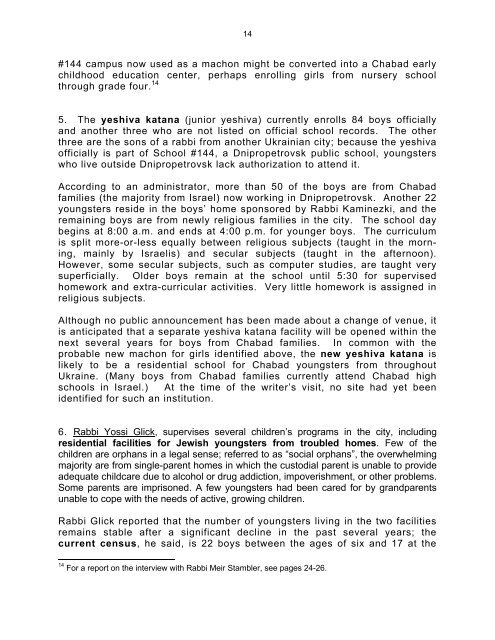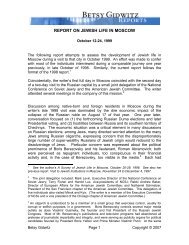(Dnipropetrovsk, Kharkiv, Krivoi Rog, Donetsk, and Kyiv) Report of a ...
(Dnipropetrovsk, Kharkiv, Krivoi Rog, Donetsk, and Kyiv) Report of a ...
(Dnipropetrovsk, Kharkiv, Krivoi Rog, Donetsk, and Kyiv) Report of a ...
Create successful ePaper yourself
Turn your PDF publications into a flip-book with our unique Google optimized e-Paper software.
14<br />
#144 campus now used as a machon might be converted into a Chabad early<br />
childhood education center, perhaps enrolling girls from nursery school<br />
through grade four. 14<br />
5. The yeshiva katana (junior yeshiva) currently enrolls 84 boys <strong>of</strong>ficially<br />
<strong>and</strong> another three who are not listed on <strong>of</strong>ficial school records. The other<br />
three are the sons <strong>of</strong> a rabbi from another Ukrainian city; because the yeshiva<br />
<strong>of</strong>ficially is part <strong>of</strong> School #144, a <strong>Dnipropetrovsk</strong> public school, youngsters<br />
who live outside <strong>Dnipropetrovsk</strong> lack authorization to attend it.<br />
According to an administrator, more than 50 <strong>of</strong> the boys are from Chabad<br />
families (the majority from Israel) now working in <strong>Dnipropetrovsk</strong>. Another 22<br />
youngsters reside in the boys’ home sponsored by Rabbi Kaminezki, <strong>and</strong> the<br />
remaining boys are from newly religious families in the city. The school day<br />
begins at 8:00 a.m. <strong>and</strong> ends at 4:00 p.m. for younger boys. The curriculum<br />
is split more-or-less equally between religious subjects (taught in the morning,<br />
mainly by Israelis) <strong>and</strong> secular subjects (taught in the afternoon).<br />
However, some secular subjects, such as computer studies, are taught very<br />
superficially. Older boys remain at the school until 5:30 for supervised<br />
homework <strong>and</strong> extra-curricular activities. Very little homework is assigned in<br />
religious subjects.<br />
Although no public announcement has been made about a change <strong>of</strong> venue, it<br />
is anticipated that a separate yeshiva katana facility will be opened within the<br />
next several years for boys from Chabad families. In common with the<br />
probable new machon for girls identified above, the new yeshiva katana is<br />
likely to be a residential school for Chabad youngsters from throughout<br />
Ukraine. (Many boys from Chabad families currently attend Chabad high<br />
schools in Israel.) At the time <strong>of</strong> the writer’s visit, no site had yet been<br />
identified for such an institution.<br />
6. Rabbi Yossi Glick, supervises several children’s programs in the city, including<br />
residential facilities for Jewish youngsters from troubled homes. Few <strong>of</strong> the<br />
children are orphans in a legal sense; referred to as “social orphans”, the overwhelming<br />
majority are from single-parent homes in which the custodial parent is unable to provide<br />
adequate childcare due to alcohol or drug addiction, impoverishment, or other problems.<br />
Some parents are imprisoned. A few youngsters had been cared for by gr<strong>and</strong>parents<br />
unable to cope with the needs <strong>of</strong> active, growing children.<br />
Rabbi Glick reported that the number <strong>of</strong> youngsters living in the two facilities<br />
remains stable after a significant decline in the past several years; the<br />
current census, he said, is 22 boys between the ages <strong>of</strong> six <strong>and</strong> 17 at the<br />
14 For a report on the interview with Rabbi Meir Stambler, see pages 24-26.



